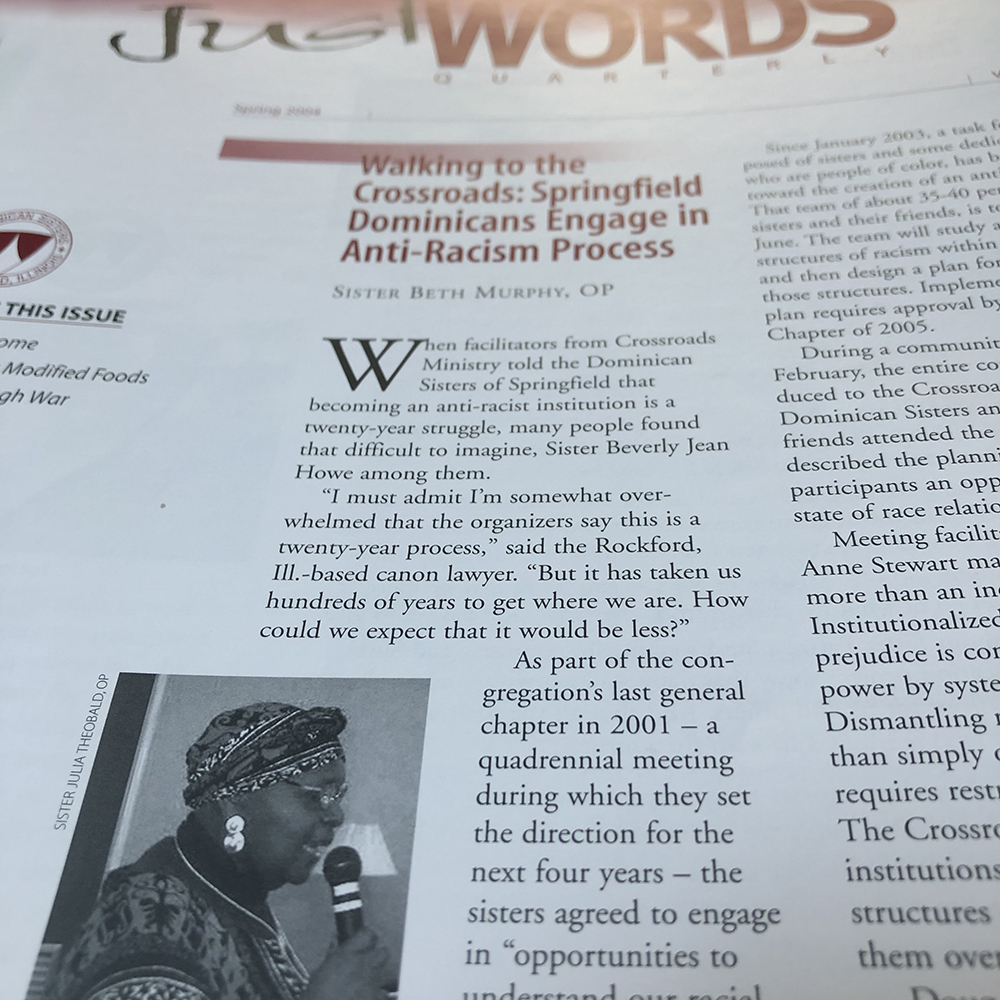
When facilitators from Crossroads Ministry told the Dominican Sisters of Springfield that becoming an anti-racist institution is a twenty-year struggle, many people found that difficult to imagine, Sister Beverly Jean Howe among them.
“I must admit I’m somewhat overwhelmed that the organizers say this is a twenty-year process,” said the Rockford, Ill.-based canon lawyer. “But it has taken us hundreds of years to get where we are. How could we expect that it would be less?”
Fulfilling a goal
As part of the congregation’s last General Chapter in 2001—a quadrennial meeting during which they set the direction for the next four years—the sisters agreed to engage in “opportunities to understand our racial biases and to embrace cultural diversity in our congregation, our church, and our world.” Working with Crossroads Ministry, a Chicago-based interfaith ministry for racial justice, is a step toward fulfilling that goal.
Since January 2003, a task force composed of sisters and some dedicated friends who are people of color, has been working toward the creation of an anti-racism team. That team of about 35-40 persons, including sisters and their friends, is to be in place by June. The team will study and analyze the structure of racism within the congregation and then design a plan for dismantling those structures. Implementation of the plan requires approval by the General Chapter of 2005.
During a community meeting last February, the entire congregation was introduced to the Crossroads Ministry process. Dominican Sisters and associates and their friends attended the meeting, which described the planning process and gave participants an opportunity to discuss the state of race relations in the United States.
Defining racism
Meeting facilitators Joseph Barndt and Anne Stewart made it clear that racism is more than an individual’s racial prejudice. Institutionalized racism occurs when racial prejudice is combined with the misuse of power by systems and institutions. Dismantling racism, then, requires more than simply overcoming prejudice. It also requires restructuring racist institutions. The Crossroads process is designed to assist institutions with analyzing their racist structures and creating a plan to dismantle them over time.
Doug king, a state employee from Springfield and an enthusiastic member of the planning and design task force, says that his participation has been a challenge to his own understanding of race and race prejudice. Participation in a two-and-a-half-day workshop about racism brought about a conversation of sorts for King, who says that the workshop “caused me to question our systems and institutions. It caused me to question even myself and my own perceptions about racism.” He sees the process as vital and life-giving, while acknowledging that it will be a challenge for the sisters and for the people of color like himself who make a commitment to the process the congregation has begun. “We are going to tread some ground that none of us have trod before,” King says, adding “We know with God’s help and our commitment we can reach that goal.”
In the struggle
Personal challenge has also been a part of the Crossroads experience for Classie Murray, Springfield Dominican Associate and another member of the planning team. A children’s librarian at Springfield’s public library, Classie wants to make a better world for her grandchildren. “Being on the task force and seeing Crossroads at work is changing me and changing my perception of this fight that we are involved in,” she acknowledges. “It is not easy for me. It is a struggle. I’m acutely aware of my own attitudes and how I react to people. Crossroads had done that for me.”
The process has been equally challenging for the sisters who serve on the design and planning task force. “Crossroads is a huge endeavor that addresses the sin of racism in our culture,” said Sister Katherine O’Connor, who along with Sister Marcelline Koch, is co-chair of the task force. “With God’s grace and our openness [Crossroads] can transform not just the Dominicans of Springfield but all of those with whom we come in contact.”

